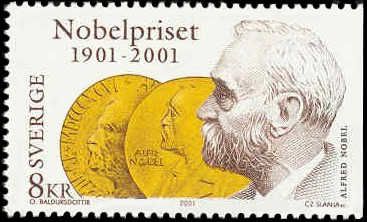
About a hundred years ago, a man looked at the morning newspaper and to his surprise and horror, read his own name in the obituary column.
The newspapers had reported the death of the wrong person by mistake.
His first response was shock. Am I here or there? When he regained his composure, his second thought was to find out what people had said about him.
The obituary read, “Dynamite King Dies.” And also “He was the merchant of death.”
This man was the inventor of dynamite and when he read the words “merchant of death,” he asked himself a question, “Is this how I am going to be remembered?”
He decided that this was not the way he wanted to be remembered. From that day on, he started working for peace. His name was Alfred Nobel and he is remembered today by the great Nobel Prize.
Alfred Bernhard Nobel (1833-1896) was a Swedish chemist, engineer, inventor, businessman and philanthropist. Known for inventing dynamite, Nobel also owned Bofors, which he had redirected from its previous role as primarily an iron and steel producer to a major manufacturer of cannon and other armaments. Nobel held 355 different patents, dynamite being the most famous. After reading a premature obituary which condemned him for profiting from the sales of arms, he bequeathed his fortune to institute the Nobel Prizes. The synthetic element Nobelium was named after him.
In 1888 Alfred’s brother Ludvig died while visiting Cannes and a French newspaper erroneously published Alfred’s obituary. It condemned him for his invention of dynamite and is said to have brought about his decision to leave a better legacy after his death. The obituary stated, Le marchand de la mort est mort (“The merchant of death is dead”)[4] and went on to say, “Dr. Alfred Nobel, who became rich by finding ways to kill more people faster than ever before, died yesterday.” Alfred (who never had a wife or children) was disappointed with what he read and concerned with how he would be remembered.
On 27 November 1895, at the Swedish-Norwegian Club in Paris, Nobel signed his last will and testament and set aside the bulk of his estate to establish the Nobel Prizes, to be awarded annually without distinction of nationality.After taxes and bequests to individuals, Nobel’s will allocated 94% of his total assets, 31,225,000 Swedish Kronor, to establish the five Nobel Prizes. This converted to £1,687,837 (GBP) at the time. In 2012, the capital was worth around SEK 3.1 billion (USD 472 million, EUR 337 million), which is almost twice the amount of the initial capital, taking inflation into account.
The first three of these prizes are awarded for eminence in physical science, in chemistry and in medical science or physiology; the fourth is for literary work “in an ideal direction” and the fifth prize is to be given to the person or society that renders the greatest service to the cause of international fraternity, in the suppression or reduction of standing armies, or in the establishment or furtherance of peace congresses.
Source: Wikipedia
Image: Swedish postage stamp issued in 2001 to mark the centenary of the institution of Nobel Prize. Courtesy https://www.blog.gangalib.org/
